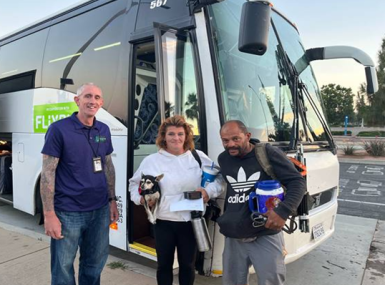Cook County FoodCare program offers healthy food, nutrition services to Medicaid recipients

Key Takeaways
Recognizing the importance of taking a holistic approach to healthcare, Cook County, Ill., is increasing access to healthy food and nutrition services for its Medicaid members through its FoodCare initiative.
FoodCare is a Cook County Health program in its CountyCare plan, which helps connect Medicaid recipients to housing, transportation and food. Within the roughly 430,000 people in Cook County that CountyCare serves, at least 6% are food insecure, according to health risk screenings. However, that number is likely much higher — with some estimates skyrocketing up to 50% — because food insecurity is underreported, according to Aaron Galeener, Cook County Health’s chief administrative officer of health plan services.
Learn more
Cook County, Ill.’s FoodCare initiative won a 2024 NACo Achievement Award in the Health category.
“It’s hard for an individual to take care of their asthma or diabetes when they’re focused on where their next meal is going to come from,” Galeener said. “So, we’ve tried to develop programs that are aimed at addressing some of these other needs that members have so that it frees them up to be able to better take care of their health.”
FoodCare works to increase health equity and food access through three programs.
• Emergency home-delivered meals for Medicaid recipients who have recently been discharged from a hospital stay or were referred by their care coordinator or dietician for food insecurity.
• A FoodCare interactive digital platform that connects Medicaid members with their own registered dietitian for unlimited dietician visits and helps them with meal planning, shopping on a budget and food delivery.
• Medically tailored meals for Medicaid members with specific conditions, and pregnant members with gestational diabetes and hypertension.
More than 13,000 meals have been delivered through FoodCare, according to Cook County Health data; more than 43,000 people have enrolled in dietitian and nutrition programming and roughly 1,400 Medicaid recipients have enrolled in the medically tailored meal programming, as well.
“We know that food nutrition underlies a number of significant chronic diseases, like diabetes, obesity, individuals who have gestational diabetes when they’re pregnant,” Galeener said. “So, we really started there, with ‘What are the health outcomes we want to impact?’ and then, ‘What are some of the significant needs or challenges that we want to address?’”
If someone who’s diabetic, for example, is enrolled in FoodCare, they receive access to a dietician who guides them on food choices that can best help them manage their diabetes. They then receive that food, which could include low glycemic index and high protein foods, through the medically tailored meal program, according to Galeener.
Foodsmart, a nutrition organization with the largest network of registered dieticians in the country, partners with Cook County Health on FoodCare. Foodsmart offers education on nutrition through its online platforms for Medicaid members and also pays them $50 in grocery money for completing their first dietician appointment, and $15 for every follow-up afterward.
“There are a series of things that they could offer more immediately than we would be able to if we were to try to build something completely new,” Galeener said. “And we wanted to ensure that we can scale the program to the right level.”
CountyCare also partners with local businesses — many of which are owned by women and minorities, Galeener noted — to prepare the meals delivered through FoodCare. The food is primarily shipped, with the exception of emergency meals, which are often delivered by care coordinators. Emergency meals are distributed when someone has an urgent need for food or when someone is housing insecure and there might not be a clear place to mail the food, according to Galeener.
According to Cook County Health data, since FoodCare launched roughly a year and a half ago, 56% of its obese users have lost weight (with an average of nine pounds lost) and 66% of people enrolled have seen an improvement in Nutriscore. Nutriscore is a nutritional rating system that calculates “positive” points, which are healthy foods such as protein, fruits, vegetables, nuts and fiber, from “negative” points, which include foods with high salt content, saturated fatty acids and sugar content.
“We’re already seeing some significant results in terms of individuals seeing weight loss, seeing more controlled diabetes, and all of that eventually leads to cost savings for us over time,” Galeener said. “So, there is a return that we expect from investing in these programs.”
Cook County Health receives roughly $600 per Medicaid member each month from the state of Illinois (the number varies, depending on age and sex). That $600 pays for medical plans, utilization, administrative costs and programs, such as FoodCare. Cook County Health creates programs like FoodCare because they not only serve Medicaid recipients better, but it also reduces an individual’s medical costs over time by how much they improve health outcomes, Galeener said.
“We’re serving a very underserved population,” Galeener said. “And that’s really aligned with the history of Cook County Health, which has been serving this population for almost 200 years now. We know that beyond the standard health issues that people face, a lot of the main drivers related to their health care are these other social risk factors.”
Related News

Insights from county leaders on the future of early childhood care and education
NACo's Prenatal-to-Three breakfast and listening session gathered county leaders to identify barriers, explore solutions and support local leaders advancing their priorities.

Team approach, website help California county tackle homelessness
Riverside County, Calif. created a multidisciplinary team to better and more efficiently serve its unsheltered population and share success stories and data through a website.

Ohio county boosts community youth programs with ARPA funding
Hamilton County, Ohio invested ARPA dollars in community organizations through the INSPIRE Youth initiative.
Webinar
Food Insecurity: How Counties are Tackling Hunger
Nearly 42 million Americans, which includes 13 million children, are considered food insecure, or in other words lack consistent access to enough food to live an active, healthy life. The issue of food insecurity is a complex problem requiring multifaceted solutions that are tailored to the needs of each community.
In this informational webinar, we will take a deeper dive into the issue of food insecurity as spotlighted in the June issue of County News and hear from communities who have accepted the challenge of alleviating food deserts through their community-based initiatives.

